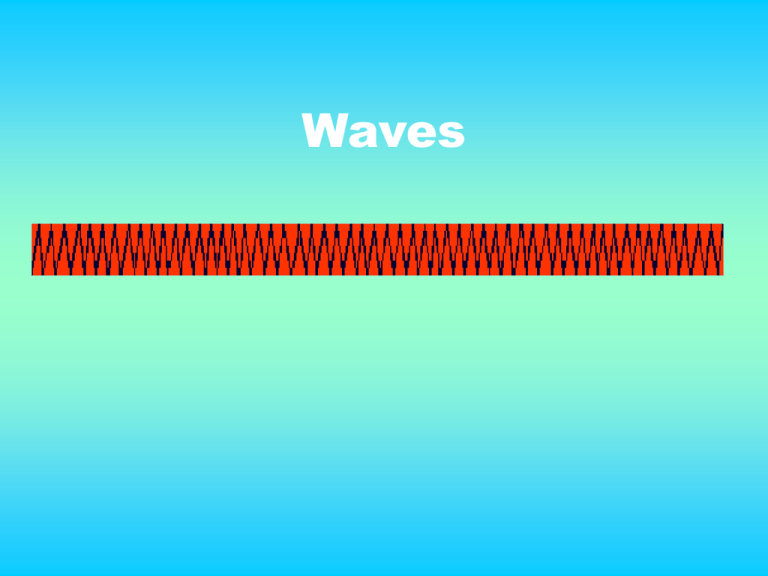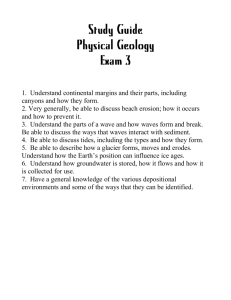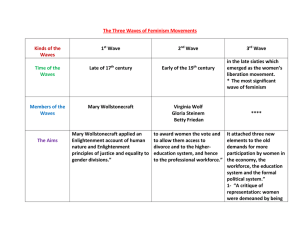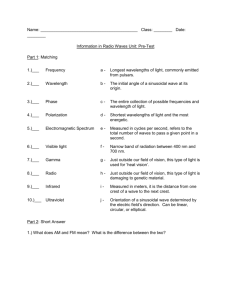Transverse and Longitudinal Waves
advertisement

Waves What are waves? • There are many different kinds of wave: • Light waves • Sound waves • Waves on water • Seismic waves • Waves along a rope, or a slinky There are two sorts of waves • Transverse waves • Longitudinal waves Transverse waves • Most waves are transverse • The vibrations in transverse waves go from side to side • The energy is travelling in one direction, with the vibrations moving at a 90o angle to the direction the wave is travelling Longitudinal waves • Longitudinal waves have vibrations moving in the same direction that the wave is travelling in • Examples of longitudinal waves are: Sound waves (in solids, liquids and gases) Shock waves (e.g. seismic waves ) A slinky (when plucked) Examples of different waves Transverse waves: Longitudinal waves: • All electromagnetic radiation, e.g. light • Ripples on water • Waves on strings • A slinky that is waved up and down • Sound • Shock waves • A slinky when plucked What do waves do? All waves carry energy What sort of energy is being carried? • Heat energy is carried by light, infra red and microwaves • X-rays and gamma rays carry energy which can cause ionisation and can damage cells • Sounds carry energy in the form of vibrations. Loud sounds can make an object vibrate (move) • Waves on water can move things, and can even be used to generate electrical energy • Televisions, radios, fibre optics and speech are all ways in which energy travels (and also information) What does a wave look like? A wave can be drawn as a wavy line: What are the main parts of a wave? • Wavelength () • This is the distance from the crest of one wave to the crest of the next wave • Amplitude • This is the height of a wave from the mid-point (where there is no displacement) to a peak • Frequency (f) • This is the number of complete waves per second, passing a certain point. It is measured in Hertz (Hz) Sound waves • Sounds are produced by vibrations • Sound travels as longitudinal pressure waves • The frequency of a sound will determine its pitch (how high or low a sound is) Hearing range • Sounds can range from very low frequencies (with a low pitch) to very high frequencies • Humans can only hear a certain range of frequencies (our hearing range) • As we get older our hearing range is reduced, and we do not hear some of the higher frequency sounds anymore High frequency sounds • High frequency sounds have a high pitch, like a mouse squeaking • High frequency sounds have short wavelengths Ultrasound • Bats send out very highpitched squeaks • This is ultrasound • Ultrasound will reflect off objects in its path • Bats can detect this and use the information to know if something is in their way, and to fly around it (or to catch it if it’s a moth) How can we use ultrasound? • Hospitals use ultrasound scans to examine unborn babies in the womb • As the ultrasound waves hit the foetus, some is reflected, and a computer converts this into an image • Ultrasound waves are safer than X-rays, which can harm a foetus Another use for ultrasound waves: • Sonar uses high frequency sound waves which reflect off the sea bed, or off shoals of fish • Reflected sound waves coming back are detected • Information obtained in this way can tell us about the features of the sea-bed, the depth of the water, or whether there is a shoal of fish nearby. This powerpoint was kindly donated to www.worldofteaching.com http://www.worldofteaching.com is home to over a thousand powerpoints submitted by teachers. This is a completely free site and requires no registration. Please visit and I hope it will help in your teaching.



